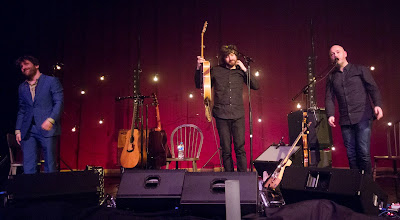Yet, Lau embody the spirit of jazz in their improvisatory performance style. There is no drummer, and I found the music most thrilling when the rhythm was provided by the virtuoso fiddle player Aidan O'Rouke. Thanks to Martin Green, there is also strong bass energy: he multi tasks, controlling the electronics alongside stunning accordion playing. The innovation in their progressive folk is so refreshing, though in songs like Throwing Pennies I thought the volume of Martin's samples was intrusive: on the album, they're more subtlety integrated into the mix. With this minor exception, the sound, and lighting was excellent. The venue added to the theatrical atmosphere: there was no lack of drama, despite the economy of forces. It was a cerebral experience, a delight for the introvert: outward interaction with the audience was limited to Martin's humorous interjections, and a rare cheer from the audience towards the end.
Lau's invention is inspried by the open spaces of the Scottish Isles. Torsa, an early highlight in the 90 minute set, evokes the landscape of an island south of Oban that Aidan knew as a child; whilst Kris was born in Orkney and has now migrated even further north to Shetland. They're steeped in Scottish culture, yet transcend geographical boundaries: a song like the closing Far From Portland evoking a universal tenderness and aching beauty. A sense of traditional culture doesn't preclude complex layers of sound, just as beauty doesn't imply a lack of dynamics. Their virtuosity can be exhilarating, the volume of the trio thunderous one moment, delicate the next. Lau also sends a message about collaboration: far from being dominated by a lead vocalist, their appeal is in the thrilling interplay. This collective spirit embodies the fact that in remote communities, interdependence is a essential to survival; too often in urbanised society the need for co-operation is overlooked. Yet, Lau is forward thinking as well as nostalgic in providing a window on a world of alternative values, informed by our connection to the natural environment and the need for mutual bonds. Even if you're not naturally drawn towards Celtic folk trios, I urge to explore their music, and performances.



No comments:
Post a Comment